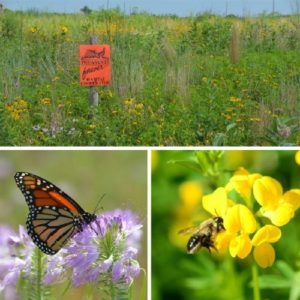 Corteva Agriscience, Agriculture Division of DowDuPont, today announced a partnership with National 4-H Council and Pheasants Forever. The program, Corteva Grows Pollinator Habitat, will support monarch butterfly and pollinator habitat at Corteva Agriscience locations throughout the United States. Through this program, Corteva Agriscience will engage 4-H youth to help increase pollinator habitats and populations, supporting biodiversity. The program will also strengthen pollinator education efforts through Pheasants Forever’s Youth Pollinator Habitat Program.
Corteva Agriscience, Agriculture Division of DowDuPont, today announced a partnership with National 4-H Council and Pheasants Forever. The program, Corteva Grows Pollinator Habitat, will support monarch butterfly and pollinator habitat at Corteva Agriscience locations throughout the United States. Through this program, Corteva Agriscience will engage 4-H youth to help increase pollinator habitats and populations, supporting biodiversity. The program will also strengthen pollinator education efforts through Pheasants Forever’s Youth Pollinator Habitat Program.
“We are committed to creating pollinator habitats, now and in the future, and our efforts are growing with the help of key partners who share our same vision,” said Krysta Harden, Corteva Agriscience Senior Vice President of External Affairs and Chief Sustainability Officer. “There are many things we can do to support bees, butterflies and other pollinators, no matter where you live. Ensuring they have adequate habitats and plentiful food sources provides a strong foundation for pollinators.”
At each location, Corteva Agriscience will provide land and financial support for the pollinator habitat, which will be planted and maintained, in part, by the site’s employees and 4-H youth leaders. Pheasants Forever will provide expertise and support including habitat seed, site preparation, planting support and ongoing mowing. In addition to providing seasonal food supplies and a home to pollinators, the sites will be used to educate students on the benefits of pollinators and their habitats and grow youth with the awareness, passion and skills to be responsible stewards of our planet for generations to come. In the spring of 2019, the first sites will be planted. Additional site plantings will take place through 2020. The majority of locations reside along monarch butterfly flyway, the Interstate 35 corridor between Minnesota and Texas.
“This new partnership is helping to expand critical habitat areas for monarch butterflies, honey bees and grassland birds, while serving as an outdoor classroom for students and Corteva Agriscience employees nationwide,” stated Howard Vincent, President and CEO of Pheasants Forever. “Our organization has taken a lead role nationally among conservation groups to promote this specific habitat variety, helping to boost agricultural production and provide diverse habitat for a wide host of species. We’re very excited to contribute to this phenomenal partnership.”
In addition, the Corteva Grows program will equip more than 30,000 4-H youth with tools and support they need to understand the importance of pollinators and how to build habitats in their communities to take action toward conserving them. Led by 4-H teen ambassadors, the pollinator curriculum will be delivered through peer-to-peer mentorship and direct teaching of younger audiences.
“Agriculture is a vital component to local communities across the U.S. and to our global economy,” said Jennifer Sirangelo, President and CEO of National 4-H Council. “By partnering with Corteva Agriscience on this important initiative, youth will have the opportunity to learn-by-doing and grow the skills to pursue their passions and navigate challenges, especially those facing today’s agriculture.”
Pollinator health isn’t new to Corteva Agriscience™. Earlier this year, to celebrate National Pollinator Week, employees at the Johnston, Iowa, Corteva Agriscience global business center constructed a pollinator demonstration garden. In 2017, employees led efforts to implement more than six acres of highly-diverse prairie habitat along a bike path that runs through the Johnston campus. In total, the campus has more than 10 acres of pollinator habitat. This new partnership is an extension of Corteva Agriscience’s commitment to pollinator habitat expansion.
About Corteva Agriscience™, Agriculture Division of DowDuPont
Corteva Agriscience™, Agriculture Division of DowDuPont (NYSE: DWDP), is intended to become an independent, publicly traded company when the previously announced spinoff is complete by June 2019. The division combines the strengths of DuPont Pioneer, DuPont Crop Protection and Dow AgroSciences. Corteva Agriscience™ provides growers around the world with the most complete portfolio in the industry — including some of the most recognized brands in agriculture: Pioneer®, Encirca®, the newly launched Brevant™ Seeds, as well as award-winning Crop Protection products — while bringing new products to market through our solid pipeline of active chemistry and technologies. More information can be found at www.corteva.com.
Follow Corteva Agriscience™, Agriculture Division of DowDuPont, on Facebook, Instagram, Twitter and YouTube.
ABOUT 4-H
4-H, the nation’s largest youth development organization, grows confident young people who are empowered for life today and prepared for career tomorrow. 4-H programs empower nearly 6 million young people across the U.S. through experiences that develop critical life skills. 4-H is the youth development program of our nation’s Cooperative Extension System and USDA, and serves every county and parish in the U.S. through a network of 110 public universities and more than 3000 local Extension offices. The research-backed 4-H experience grows young people who are four times more likely to contribute to their communities; two times more likely to make healthier choices; two times more likely to be civically active; and two times more likely to participate in STEM programs.
About Pheasants Forever
Pheasants Forever, including its quail conservation division, Quail Forever, is the nation’s largest nonprofit organization dedicated to upland habitat conservation. Pheasants Forever and Quail Forever have more than 149,000 members and 725 local chapters across the United States and Canada. Chapters are empowered to determine how 100 percent of their locally raised conservation funds are spent; the only national conservation organization that operates through this truly grassroots structure. Since creation in 1982, Pheasants Forever has spent $784 million on 530,000 habitat projects benefiting 17 million acres nationwide.
